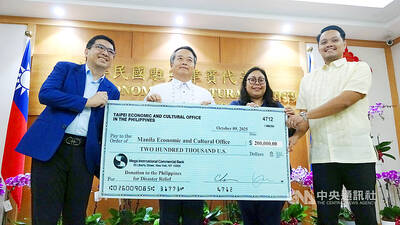Taiwan placed 24th in a global human development index (HDI), ahead of Singapore, South Korea and Hong Kong, according to a report released by the Executive Yuan yesterday.
The report by the Cabinet's Directorate General of Budget, Accounting and Statistics, citing figures from the UN Development Program, showed that Taiwan's HDI is 0.895, down one place from last year's 23rd.
China ranked 105th this year, with an HDI of 0.721.
While Hong Kong came in 27th, Singapore was ranked 29th and South Korea 31st.
Norway leads among the 176 countries surveyed, with an HDI of 0.944. It is followed by Iceland's 0.942 and Sweden's 0.941. The US placed 7th, with an HDI of 0.937. The HDI of the UK is 0.93, placing it 13th.
The HDI is based on four major indicators using data for 2001: life expectancy at birth; the adult literacy rate; combined primary, secondary and tertiary gross enrollment rate; and GDP per capita.
Taiwan's life expectancy at birth was 75.6 years, 36th in the world, while that of China was 70.6 years, ranking 80th.
Japan is first in this category, with life expectancy of 81.3 years. It is followed by Sweden's 79.9 years and Iceland's 79.6 years.
Life expectancy in Hong Kong is 79.7 years, third in the world. Singapore is ranked 24th, with its life expectancy at 77.8 years. South Korea is ranked 38th, with a life expectancy of 75.2 years.
Taiwan's adult literacy rate is 95.8 percent, 60th in the world. China is 100th, with an adult literacy rate of 85.8 percent.
Japan's literacy rate is 16th, at 99 percent. Hong Kong has a 93.5 percent adult literacy rate, the world's 69th. Singapore's adult literacy rate is 92.5 percent, or 76th. South Korea is 47th, with a literacy rate of 97.9 percent.
Taiwan's combined primary, secondary and tertiary gross enrollment rate is 93 percent, 14th in the world. China ranked 107th, with 64 percent.
Japan's enrollment rate is the world's 36th, at 83 percent. Hong Kong rate is 63 percent, 116th in the world. Singapore's combined primary, secondary and tertiary gross enrollment rate is 75 percent, placed at the world's 72nd. South Korea is placed at 18th, with a combined primary, secondary and tertiary gross enrollment rate of 91 percent.
Australia has the world's highest gross enrollment rate -- recorded at 114 percent. It is followed by Sweden's 113 percent and the UK's 112 percent.
Taiwan's GDP per capita is US$22,155, the world's 22nd. That of China is US$4,020, 103rd in the world.
Japan's GDP per capita is 14th in the world, at US$25,130. Hong Kong's GDP per capita is US$24,850, 15th in the world. Singapore's GDP per capita is US$22,680, ranking 21st. South Korea is 38th, with GDP per capita of US$15,090.
Luxemburg has the world's highest GDP per capita: US$53,780. The US is 2nd, with GDP per capita of US$34,320. It is followed by Iceland's US$29,990.

A drunk woman was sexually assaulted inside a crowded concourse of Taipei Railway Station on Thursday last week before a foreign tourist notified police, leading to calls for better education on bystander intervention and review of security infrastructure. The man, surnamed Chiu (邱), was taken into custody on charges of sexual assault, taking advantage of the woman’s condition and public indecency. Police discovered that Chiu was a fugitive with prior convictions for vehicle theft. He has been taken into custody and is to complete his unserved six-month sentence, police said. On Thursday last week, Chiu was seen wearing a white

The Taoyuan Flight Attendants’ Union yesterday vowed to protest at the EVA Air Marathon on Sunday next week should EVA Airway Corp’s management continue to ignore the union’s petition to change rules on employees’ leave of absence system, after a flight attendant reportedly died after working on a long-haul flight while ill. The case has generated public discussion over whether taking personal or sick leave should affect a worker’s performance review. Several union members yesterday protested at the Legislative Yuan, holding white flowers and placards, while shouting: “Life is priceless; requesting leave is not a crime.” “The union is scheduled to meet with

‘UNITED FRONT’ RHETORIC: China’s TAO also plans to hold weekly, instead of biweekly, news conferences because it wants to control the cross-strait discourse, an expert said China’s plan to expand its single-entry visa-on-arrival service to Taiwanese would be of limited interest to Taiwanese and is a feeble attempt by Chinese administrators to demonstrate that they are doing something, the Mainland Affairs Council said yesterday. China’s Taiwan Affairs Office (TAO) spokesman Chen Binhua (陳斌華) said the program aims to facilitate travel to China for Taiwanese compatriots, regardless of whether they are arriving via direct flights or are entering mainland China through Hong Kong, Macau or other countries, and they would be able to apply for a single-entry visa-on-arrival at all eligible entry points in China. The policy aims

The government yesterday donated US$200,000 to the Philippines to support post-earthquake relief and recovery efforts, following a powerful magnitude 6.9 quake that struck Cebu Province late last month, killing at least 72 people and injuring 559 others. The donation was presented earlier yesterday by Representative to the Philippines Wallace Chow (周民淦) to Cherbett Maralit, deputy resident representative of the Manila Economic and Cultural Office, at Taiwan’s representative office in Manila. In his remarks, Chow expressed concern for those affected by the magnitude 6.9 earthquake that struck the central Philippines on the night of Sept. 30. "We sincerely hope for the earliest possible